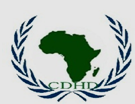By organizing its first general elections in 2006 the Democratic Republic of Congo should have moved to a post transition phase where democracy is consolidated. Current facts and practices show divers challenges to the democratization process and retain the Congo in a form of perpetual transition.
After seven years of “democracy” in Congo, CDHD has decided to undertake a project that will assess the state of democracy by analyzing the functioning of institutions, application of laws and effectiveness of accountability between voters and elected leaders. The project will take a form of workshops where academic scholars and experts on human rights and democracy will present papers and interact with participants.
A fundamental objective this project pursues is to assess the quality of democracy in Congo from 2006 to 2013 and evaluate this "democratic evolution".
In order to perceive the level of democratization in Congo, questions raised by this project should relate to the above democracy indicators; they are formulated as follows:
How are current rule of laws applied to Congolese citizens? The application of laws to citizens should be based on the principle of equality. This project will analyse how the right to equality before the law is guaranteed by courts and tribunals.
Does the current electoral system facilitate the organization of free and fair elections? The Congolese electoral system, as CDHD defined it, comprises legislations and institutions whose mission is to guarantee the organization of successful elections. By undertaking this project CDHD will assess the contribution of the Congolese electoral system to democracy
Does accountability between voters, elected leaders and State’s institutions contribute to the success of democracy in Congo? As described above accountability establishes a liable relationship between voters and elected leaders, and between State’s institutions. This project will assess the political maturity of Congolese in choosing their leaders, the accountability of elected leaders to voters and the application of checks and balance of power between state’s institutions.
How are civil and political rights implemented by the State? These are basic human rights that any democratic State should implement.

